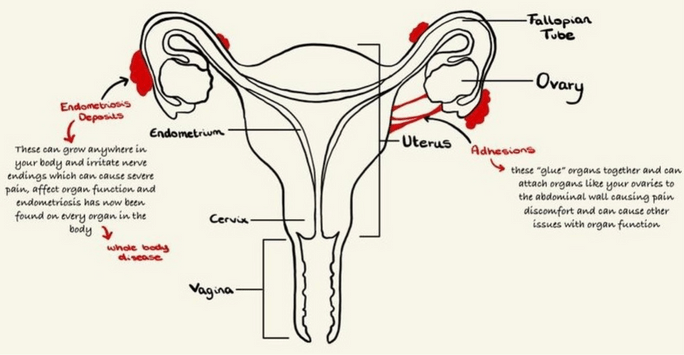
Student Spotlights pass the mic to our student doctors, to hear their take on their School experience and shine the light on a particular role, team or pathway through the School of Medicine.
Year One Student Doctor Megan Lawrence is passionate about spreading awareness on Endometriosis, a condition that affects 1 in 10 women in the UK, following her own diagnosis aged 16 and research she carried out as part of an EPQ (Extended Project Qualification).
"I am a first year medical student here in Liverpool but am originally from Manchester. Pursuing medicine stemmed from an interest in science and growing up reading my dad’s books on pre-hospital trauma, but also from my own experience with endometriosis. I was diagnosed at 16, five years after first going to my GP with symptoms.
I was drawn to Liverpool by the opportunity for case-based learning and the huge range of hospitals available for clinical placements, something I am really looking forward to starting next year.
Endometriosis: The common disease many people haven’t heard of
Before coming to medical school I completed an EPQ like many A-level students and mine was focused on stigma surrounding endometriosis and its contribution to average diagnosis times in the UK of 7-8 years.
Endometriosis is a condition which affects 1 in 10 people assigned female at birth and is characterised by the growth of endometrial-like tissue in areas outside of the uterus.
It is a whole-body disease, not just gynaecological, although gynaecology is a common pathway for diagnosis, as endometrial deposits have been found on every organ in the body, including the brain.
Endometriosis has no known cause or cure as it stands, and treatments are limited to strong painkillers, hormonal contraceptives to manage symptoms and surgery. Symptoms include severe pain (not always cyclical), heavy or irregular periods, bowel and bladder issues, back and leg pain, infertility struggles and lots more, depending on the extent and location of disease. It has been categorised by the NHS as one of the top 20 most painful conditions (link).
 Megan's own drawing illustrates Endometriosis
Megan's own drawing illustrates Endometriosis
My research into the condition
My research included designing and distributing a questionnaire to both men and women via local, national and international forums, as well as conducting interviews with endometriosis patients from countries including England and Africa.
The questionnaire received over 1700 responses, and 16 women with diagnosed endometriosis were interviewed over the phone, by email or on Zoom. I completed the research alone over the course of roughly six months.
It was found that 94.7% believed gynaecological conditions aren’t talked about enough, with 443 people mentioning “embarrassment” or “shame” as the reason for this and 19.5% mentioning stigma directly. 16.6% mentioned a lack of education being the reason for avoidance in conversation, which could be viewed as cause and effect; a lack of education and therefore understanding leading to avoidance in later life, resulting in stigma.
According to Endometriosis UK (link), 62% of women would delay going to their doctor to discuss gynaecological issues because of embarrassment, not thinking it was serious or being worried they wouldn’t be taken seriously.
This is extremely worrying data, as the longer it takes to diagnose the disease, the more time it has to progress and therefore affect quality of life, other organs and fertility (30-50% of women with endometriosis experience infertility issues).
This research highlights the need for more education, as young as primary school, to teach children about the normal, as well as the abnormal. It also emphasises the need for women to feel comfortable in approaching their GP and for doctors to take the issue seriously and escalate patients to secondary care when necessary.
As a student doctor, I think understanding what patients sometimes have to go through just to get the basic care that they need, and the fact that most patients simply want to be believed and heard, will be really important moving forward with my studies.
Endometriosis Action Month
March is Endometriosis Action Month (link) and is spearheaded by Endometriosis UK, the only nationally recognised endometriosis charity in the UK. Head to the Endometriosis UK website (link) for more information on endometriosis, to hear from patient perspectives or to see what more you could do to make diagnosis easier for patients. I also run an Endometriosis Instagram account (link) which contains facts, patient perspectives, myths, useful diagrams, definitions and more.
If you do research endometriosis, please be aware of the vast amount of misinformation currently available online. Common misinformation includes that endometriosis is the growth of endometrium outside the uterus rather than endometrial-like tissue, which is not the same. There is also the misconception that a hysterectomy will cure endometriosis, which is not true. No cure currently exists for endometriosis.
The way I see it, everyone knows 10 women, so everyone knows endometriosis. It shouldn’t be so hard for patients to get the care they need in a timely manner. The more we know and the more we are willing to learn, the better.
As it stands, patients deserve better, and hopefully we will achieve a better standard of care in the future. All I can ask is that in the future, if a woman comes to you with symptoms of endometriosis, and you have the power to refer them to gynaecology for more in depth tests and hopefully a definitive answer, please believe them, and please provide the care they need.
Discover more
- See the Endometriosis UK website (link) and Megan’s Endometriosis Instagram account (link) for more information on the condition.
- Passionate about women’s health? Why not join Liverpool's Student Neonatal Obstetrics and Gynaecology Society, SNOGS (link).
- Get in touch with mednews@liverpool.ac.uk if you are interested in stepping into the Student Spotlight or would like to nominate a student or group to do so.